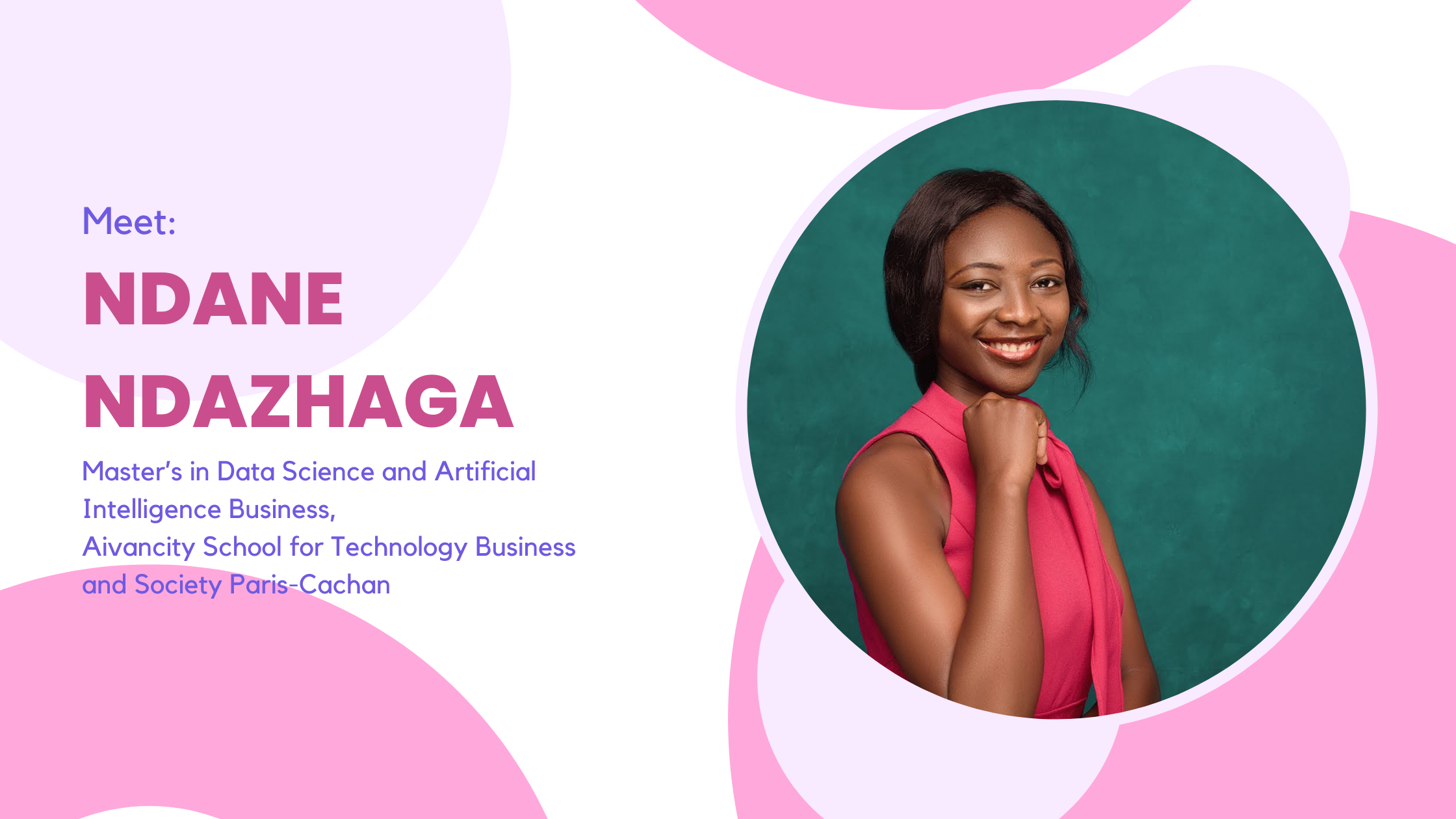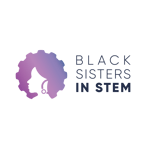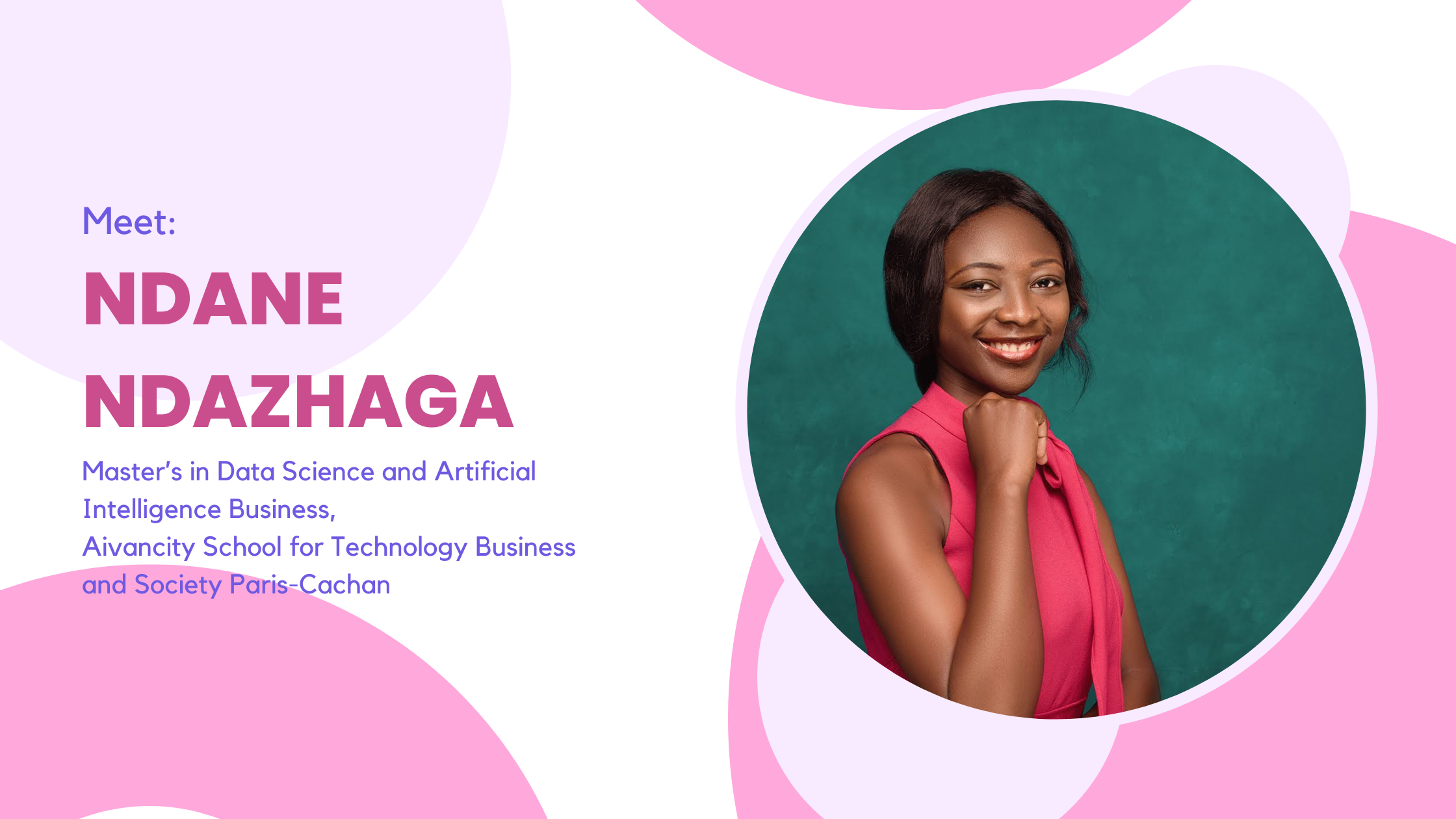The theme for #IWD2022 was #BreakTheBias, a call to do our part in creating a world where no one is discriminated against because of their gender. We all know that bias is present, and that it makes it difficult to move ahead especially as Black women. But this year and beyond, we want to challenge everyone to actively call out and stand against stereotypes and biases seen against Black women and women all around the world.
As part of our #IWD activities, we featured our fellows and how they continue to #BreakTheBias each day by excelling in fields in which Black women are typically underrepresented. Every day they continue to excel, they help to break the bias a little more and inspire other Black women to follow in their footsteps.
This spotlight is on the lovely Ndane Ndazhaga, a master’s degree student in Data Science and Artificial Intelligence Business at Aivancity School for Technology Business and Society Paris-Cachan. Ndane is making waves at her Master’s program and we were excited to speak to her about her experience and advice for breaking the bias!

What were some of the obstacles you had to overcome as a Black woman pursuing your Master’s degree?
I faced two major obstacles in pursuing my Master’s degree – I resumed late and had missed almost two months of coursework, and I found it difficult to settle down in a new country/environment.
I resumed my degree in November of 2021 and, by then, I had missed almost two months of coursework. It was challenging because I had to not only catch up, but also adapt to the heavy workload. Unfortunately, I had already missed tons of classes, assignments, and projects. Because of this, I scrambled to reach out to my professors and coursemates to catch up, which cost me valuable study time.
As all this was happening, I had to learn how to adapt to a new style of teaching. The French educational system is fundamentally different from what I was used to. We had a series of coding projects, group work, and presentations in a variety of courses like philosophy of science, history of science, business courses, and ethics. And all this was in addition to studying data science!
Also, settling down in a foreign country was not easy. There were issues in many areas, from getting accommodation, to moving in, applying for a social security number, and opening a bank account. In particular, I encountered a lot of delays from cross-border payments, mostly because of the Nigerian financial system’s uniqueness (and these delays affected my tuition payment). I also had some issues with becoming acquainted with France, as there were language and cultural barriers that affected my making friends.
Looking back, I realize that all these situations provided me with an opportunity to learn, grow, and develop myself into a better person, one who can adapt to dynamic environments while also meeting expectations under tight schedules. I can definitely say that I am proud of the lady I have become as a Black woman and leader, especially in the data science and artificial intelligence space.
I am especially grateful for family, friends, and the Yielding Accomplished African Women community who stood by me during the period of transition. Diana, the CEO of Black SiS, kept checking in on me to find ways she could provide support, and that was extremely thoughtful of her.
What are some of the ways you think we can #BreakTheBias as young Black women?
We need communities like Black Sisters in STEM.
Communities where young Black women with similar goals can interact and grow together. These communities help us to foster meaningful relationships. And, some of these relationships help in job recommendations, which thereby helps to increase the number of women in tech and finance. These communities also encourage young Black women by organizing various training sessions for women, and holding career inspirational sessions to guide them in their career choices.
We also need to highlight and spotlight the achievements of Black women to encourage and inspire others.
Highlights and spotlights aid in increasing the visibility of Black women. And it’s important for us to have people we can look up to. Because, as a young Black woman, there will be challenges and choices that need to be faced/made in order to excel in your career. Some of these include deciding to make a career switch, moving on to the next job, getting an advanced degree, etc.
One of such women I have always looked up to is Kehinde Ladipo, a software engineer at Microsoft Lagos, Nigeria. She is my mentor, and has always been there to offer guidance when I need to move to the next level in my career or when I am faced with challenges.
What advice do you have for someone who wants to pursue her master’s or advanced degree?
The only limitation is you.
Go for it, irrespective of whatever your friends or the environment try to push on you. It’s definitely not going to be an easy journey but it will definitely produce a new wave of opportunities not originally available to you.
Women have only 30% representation in STEM careers and Black women have even less, that is why various communities have been pushing and hoping to get more women in STEM. Black Sisters in STEM is relentless in empowering Black college women to reach their full potential by providing them with the resources and opportunities to do so. We are building the largest talent pipeline of Black women in STEM. Would you like to support more Black college women in STEM like Ndane? Are you looking for a community of like-minded Black college women?



%20(Landscape))%20(3).png?width=352&name=Black%20SiS%20Sign%20Ups%20for%20Tabling%20%20(Medium%20Banner%20(US)%20(Landscape))%20(3).png)
.png?width=352&name=LINKEDIN%20-%20AFTER%20(19).png)

Leave a Comment